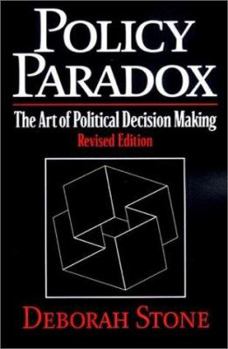Policy Paradox: The Art of Political Decision Making
Select Format
Select Condition 
Book Overview
Policy making is a political struggle over values and ideas. By exposing the paradoxes that underlie even seemingly straightforward policy decisions, Policy Paradox shows students that politics cannot... This description may be from another edition of this product.
Format:Paperback
Language:English
ISBN:0393976254
ISBN13:9780393976250
Release Date:July 2001
Publisher:W. W. Norton & Company
Length:448 Pages
Weight:1.25 lbs.
Dimensions:0.9" x 6.1" x 9.3"
Customer Reviews
5 ratings
Extremely interesting & valid - very stimulating reading
Published by Thriftbooks.com User , 15 years ago
Very stimulating reading and very applicable in many kinds of negotiations & meetings, not just "policy making" as in government. Her thesis is the "most books" assume policy should be rational and analyze when it is not. She argues that policy is INTRINSICALLY a paradoxical, conflicting process where (to greatly simplify) some people see A and others see B and others see C no matter how much data and rationality are tossed about, and that is HER starting point for discussing "policy making." I found it very stimulating and see wide ranging applications in my work and even outside work for these ideas. It's a fairly long book and not to be skimmed so it defies easy summary.
A profound and deceptively easy read
Published by Thriftbooks.com User , 22 years ago
Stone writes this book for people who are interested in implementing public policy, not merely studying it as an academic exercise. She takes us beyond the methodological self-satisfaction of too many academics and points out how applied policy arenas, from the simplest of settings like the school yard to the most complex of arenas such as national defense or social welfare policies, are characterized by the phenomenon of policy paradox.It's not easy to find a find a profound book in the area of policy analysis. The typical book, as a rule, is analytically sharp, but isn't usually notable for the insight it yields. Stone argues that it is wholly inadequate to ground decision-making for a wide range of policy issues and contexts, characterized by policy paradox, in conventional rationalist terms. Like Alberto Guerreiro Ramos, Stone finds what she calls the "rationality project" or "calculative rationality" at once typically characteristic of the discipline of policy analysis and inadequate as means/method for analyzing a broad range of contemporary public policy issues. Her analysis suggests that this inadequacy becomes increasingly transparent, the closer one gets to the concrete challenges of implementation. While in some ways she doesn't go as far as Ramos in analyzing and articulating alternative political theoretical grounds for policy analysis, she is notably clear and remarkably articulate as far as she goes, revealing among other things, how the very movement from policy analysis at large toward implementation analysis in particular is likely to bring to the surface, what may otherwise remain hidden paradoxes of public policy.In the face of the phenomenon of policy paradox, Stone grounds the enlargered policy analytic framework she offers in the specifically interactive context of political theory. Politics may unfold in higher or lower forms (differentiated by Ramos and others) and which Raghavan Iyer portrays diagramatically through interlocking ascending and descending triangles in his book Parapolitics. While Stone doesn't make this differentiation explicit, nevertheless, she compactly interweaves this kind of political understanding with an understanding of literary theory, drawing upon a deep understanding of the often covert role of metaphor in language. Throughout her text, she brings this kind of fundamental rhetorical insight to the surface and reveals the use of metaphor in processes of reasoning, notably including "calculative rationality." Stone's interweaving of insights from political theory and rhetorical theory in turn, suggests an analytic means for penetrating the obscurantist or covert "cognitive politics" that she, like Ramos, appears to believe, too often masquerade in semi-imperial fashion, as "rational" solutions to policy problems. At bottom, Stone contrasts the "calculative rationality" which she finds characteristic of much of the policy analysis field with a broader notion of political reason that she
In-Depth, Realistic and Readable
Published by Thriftbooks.com User , 22 years ago
A most useful book, full of insightful theories that are backed up by realistic analysis and applications. Highly recommended and would very likely be delightful to anybody who is not a die-hard ideologue.
Stone is Enlightened
Published by Thriftbooks.com User , 23 years ago
This scholar not only shares her understanding of complex patterns and interconnections of policy decision-making but also writes so readably! She captures what used to be in my mind as a very messy business. After I completed the book, I have much clearer concept of how and why political decision-making happens. I thought James G. March was the father of decision-making theory. Deborah Stone has become the dominant mother.
Strongly recommended
Published by Thriftbooks.com User , 24 years ago
Policy Paradox is truly a gem. Stone's language is clear, entertaining and very educating. The book is very witty and can be recommended to anyone interested in the peculiarities of political decision-making. I treasure my copy.





